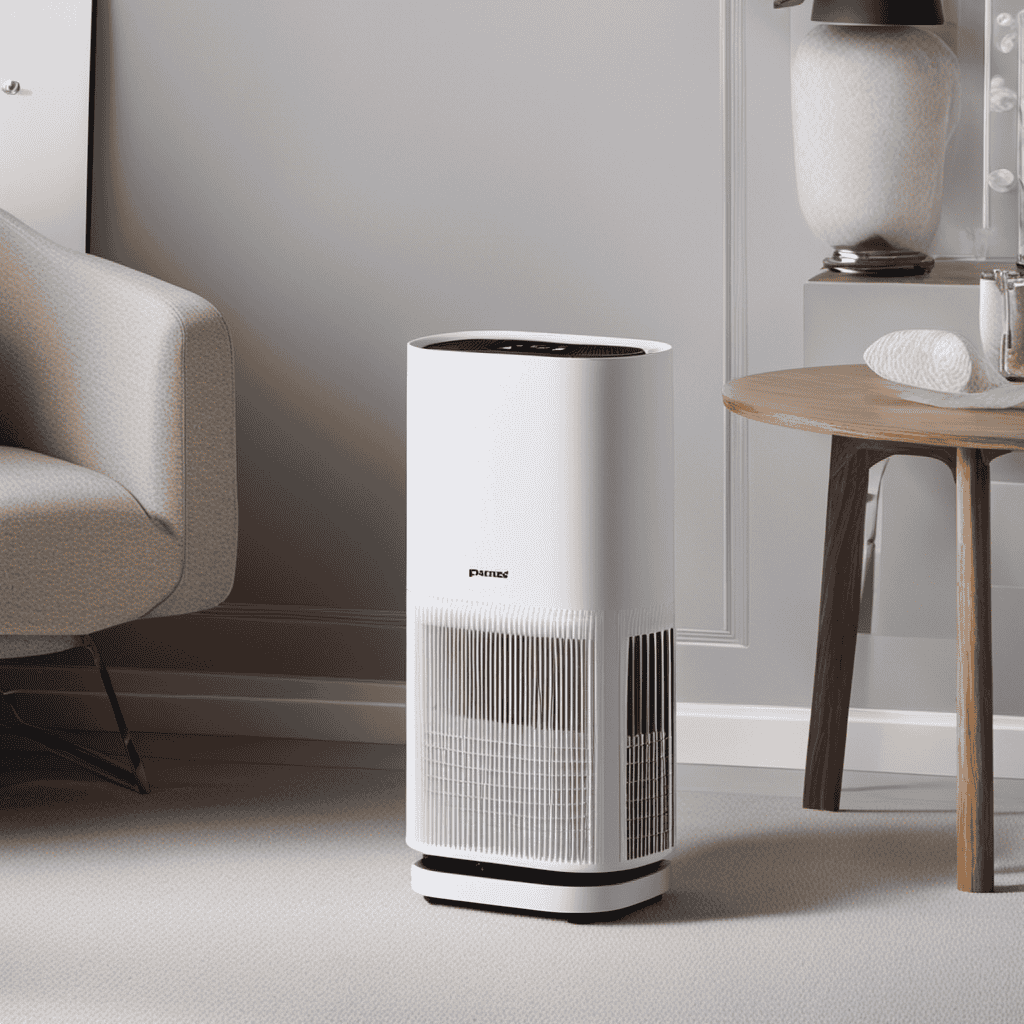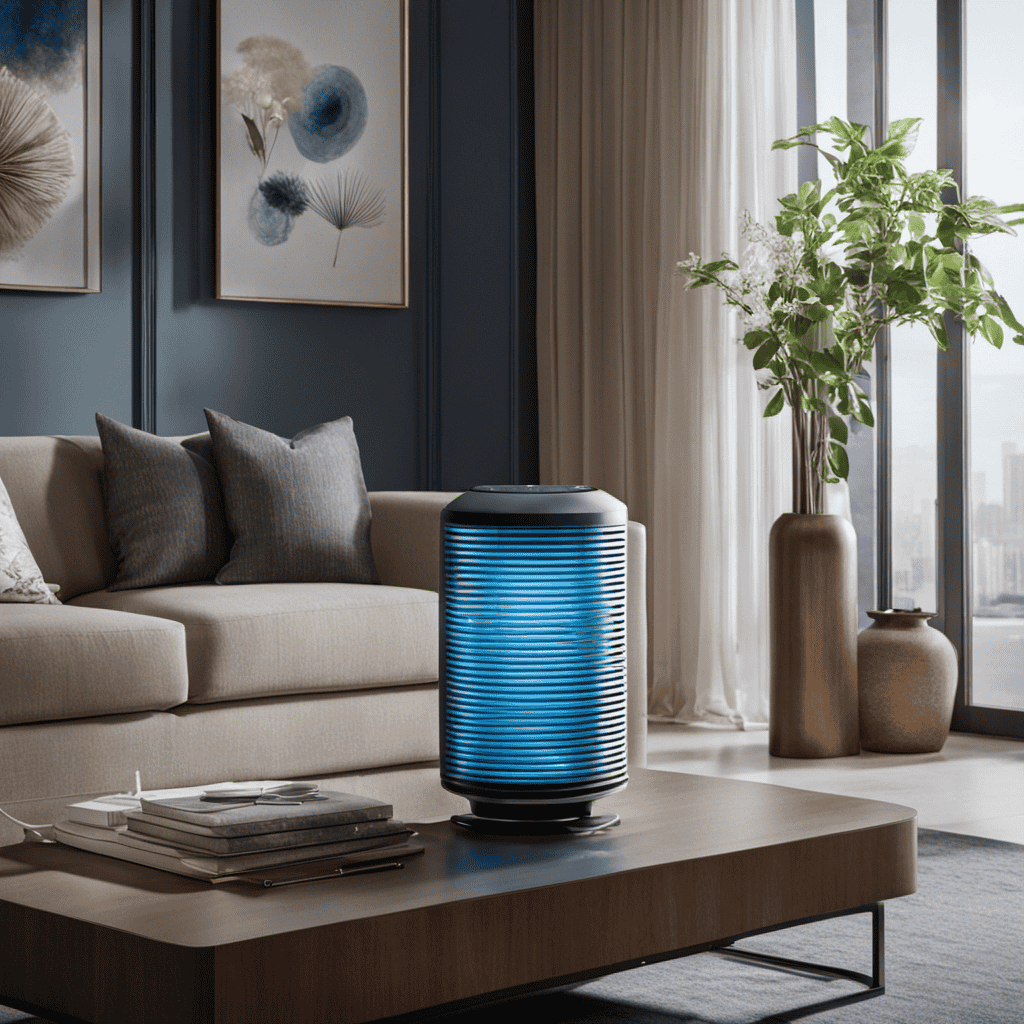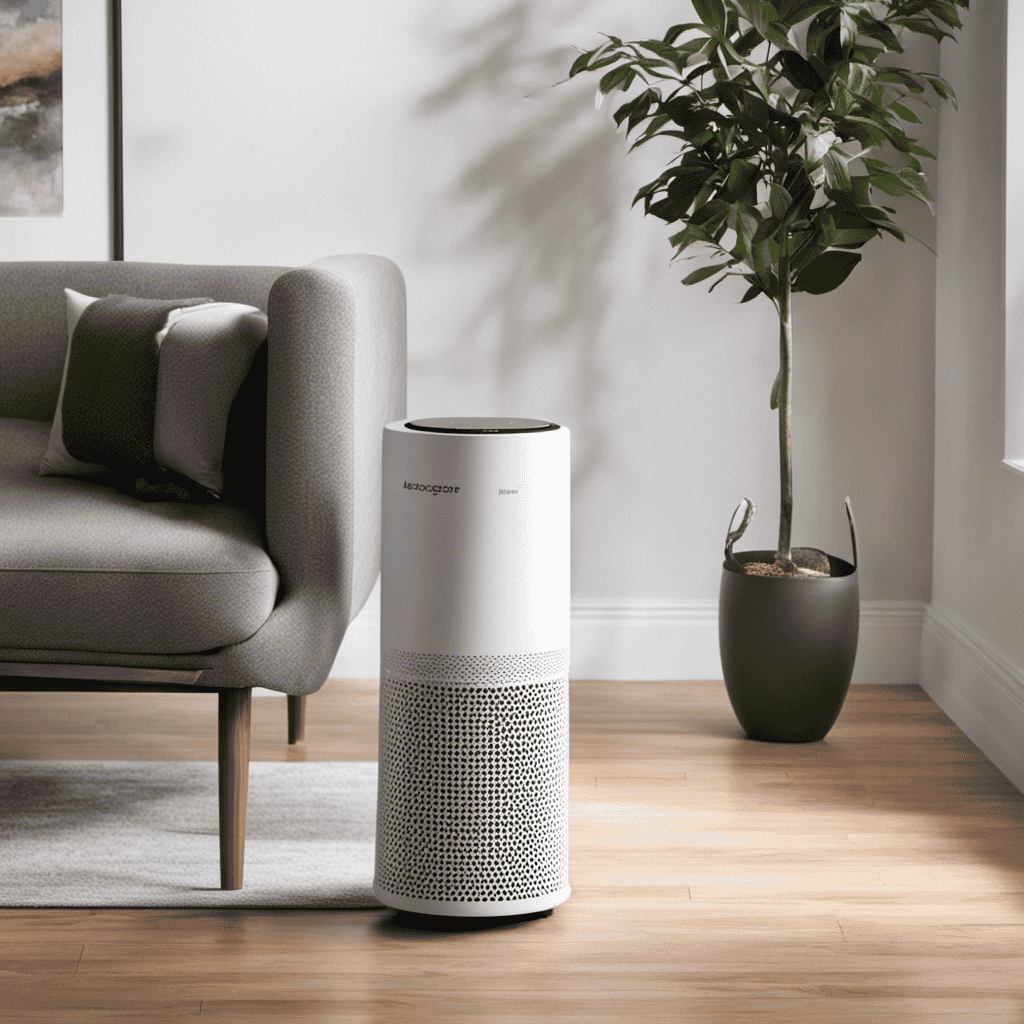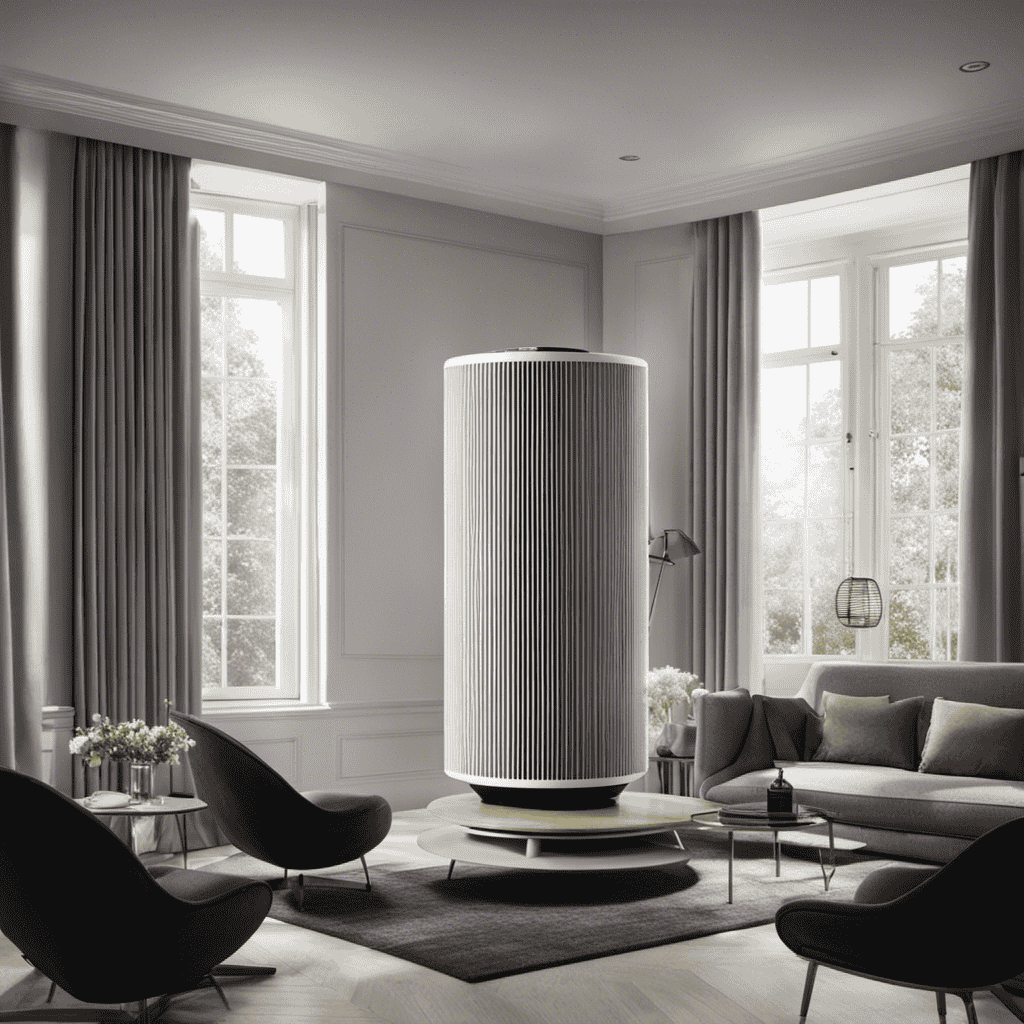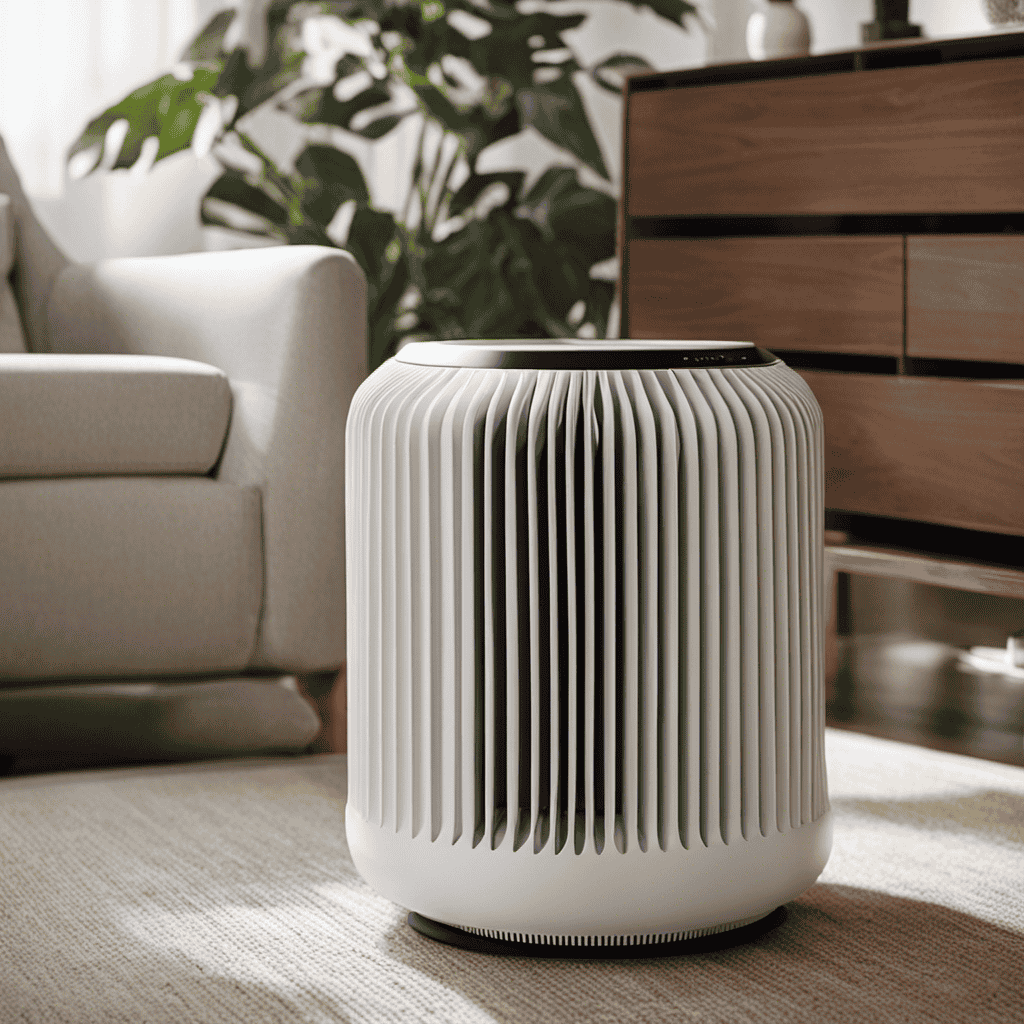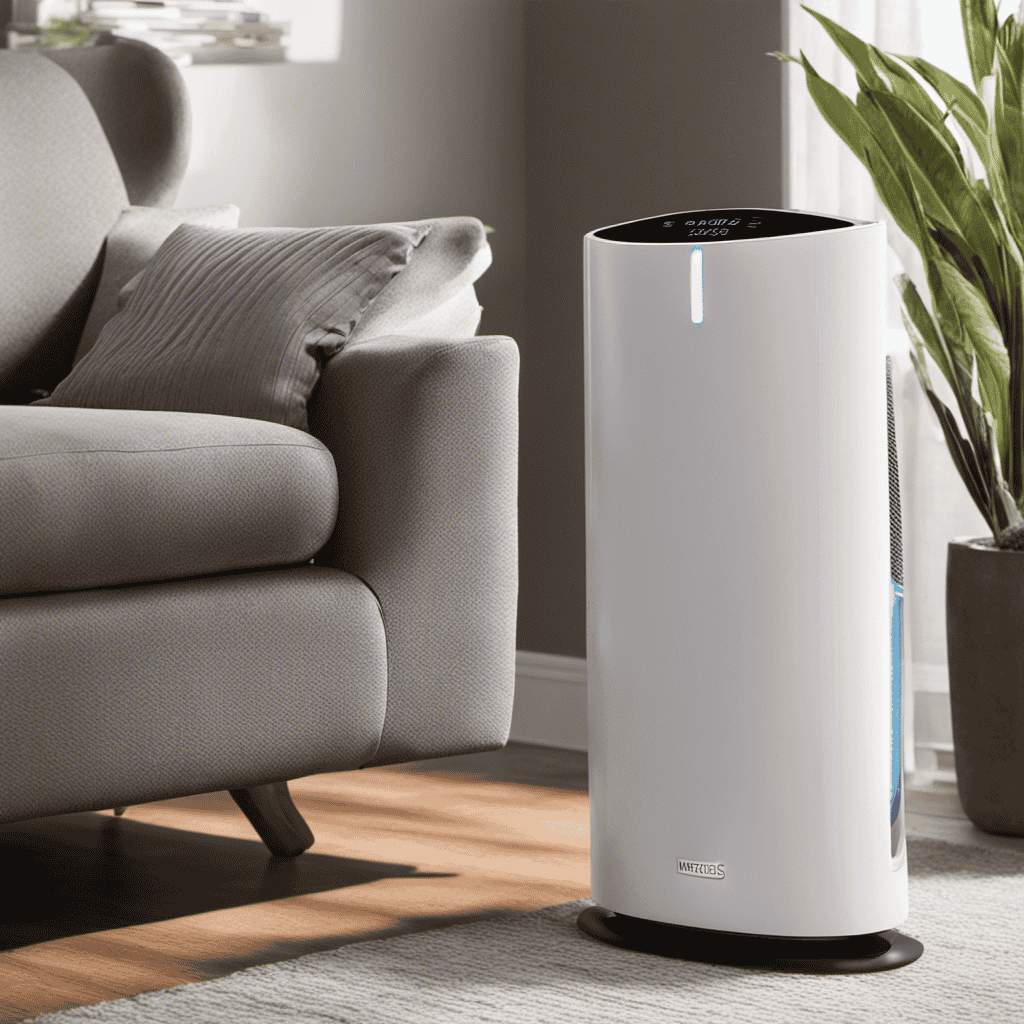I have always been intrigued by how ionizers function in air purifiers and their effects on indoor air quality. Therefore, I made the decision to delve into the research and gather all the necessary information.
In this article, we’ll explore what an ionizer is, how it functions in air purifiers, and the benefits it offers. Additionally, we’ll compare ionizers to HEPA filters to determine which is better.
Plus, we’ll address concerns about safety and examine their effects on respiratory health. Join me on this informative journey to uncover the truth about ionizers on air purifiers.
Key Takeaways
- Ionizers release negative ions into the air, which attach to airborne particles and make them heavy, causing them to fall to the ground.
- Ionizers can improve air quality by reducing the number of pollutants in the air, leading to a cleaner and healthier living environment.
- Incorporating an ionizer into your home can have multiple benefits, including improved sleep quality, reduced allergens in the air, and a more restful sleep for allergy sufferers.
- While some ionizers may emit harmful ozone gas, properly designed and regulated ionizers pose minimal risk to human health and can provide potential health benefits in addition to cleaner air.
Understanding Ionizers and Air Purifiers
To understand ionizers and air purifiers, you’ll need to know how they work to clean the air in your home.
Ionizers are devices that release negative ions into the air. These negative ions attach themselves to airborne particles, such as dust, allergens, and bacteria, causing them to become heavy and fall to the ground. This process, known as ionization, helps to improve air quality by reducing the number of pollutants in the air.
In addition to removing particles from the air, negative ions have been found to have several benefits for our health. They can help to improve mood, increase energy levels, and reduce stress.
Overall, ionizers play a crucial role in the air purification process, helping to create a cleaner and healthier living environment.
How Ionizers Work in Air Purifiers
Discover how ionizers in air purifiers help to remove pollutants and improve indoor air quality. Ionizer technology plays a crucial role in capturing and neutralizing harmful particles in the air. Here’s how it works:
-
Ionization: Ionizers release negatively charged ions into the air. These ions attach themselves to airborne particles, such as dust, pollen, and bacteria.
-
Particle agglomeration: The negatively charged particles then attract positively charged particles in the air. This process causes the particles to clump together, making them easier to capture.
-
Removal of pollutants: Once the particles are larger and heavier, they can be effectively trapped by the air purifier’s filtration system, which includes activated carbon filters.
When comparing ionizers and activated carbon filters, it’s important to note that ionizers can remove smaller particles, while activated carbon filters excel at removing odors and chemicals.
Combining both technologies in an air purifier can provide comprehensive air purification for a healthier indoor environment.
The Benefits of Ionizers in Air Purifiers
Get cleaner and fresher indoor air by using an ionizer in your home. Ionizers are air purifiers that release negative ions into the air. These negative ions attach to pollutants, such as dust, pollen, and pet dander, causing them to become heavier and fall to the ground. This effectively removes these harmful particles from the air you breathe. But did you know that ionizers can also improve your sleep quality? Research has shown that negative ions have a positive effect on sleep patterns. They can help regulate serotonin levels, which in turn can promote relaxation and better sleep. Additionally, negative ions can reduce the presence of allergens in the air, leading to a more restful sleep for allergy sufferers. Incorporating an ionizer into your home can have multiple benefits, including cleaner air and improved sleep quality.
| Benefits of Ionizers | ||
|---|---|---|
| Removes pollutants from the air | Promotes relaxation and better sleep | Reduces allergens in the air |
Ionizers Vs. HEPA Filters: Which Is Better
When it comes to air purifiers, the choice between ionizers and HEPA filters can be a tough decision. Understanding the differences between the two is crucial in determining which one is more effective in improving air quality.
Additionally, it is important to consider any potential health risks associated with ionizers, as they release charged particles into the air that may have adverse effects on respiratory health.
Ionizers Vs. HEPA: Differences
Learn about the differences between ionizers and HEPA filters on air purifiers and how they affect the air quality in your home.
Ionizers are devices that use electricity to create negative ions, which attach to airborne particles and cause them to fall to the ground.
On the other hand, HEPA filters use a dense mesh of fibers to trap particles as small as 0.3 microns, including dust, pollen, and pet dander.
When comparing ionizers to ozone, it is important to note that ionizers do not generate ozone, while ozone generators intentionally produce ozone to eliminate odors and kill bacteria.
In terms of effectiveness, ionizers are less effective than activated carbon filters in removing odors and chemicals from the air.
This is because activated carbon has a large surface area that can adsorb and trap these pollutants.
Effectiveness of Ionizers
The effectiveness of ionizers is lower compared to activated carbon filters in removing odors and chemicals from the air. Ionizers work by emitting negative ions into the air, which attach to positively charged particles, causing them to become heavy and fall to the ground. However, they do not remove these particles from the air completely.
On the other hand, activated carbon filters are highly effective in trapping and absorbing odors and chemicals, thanks to their porous structure. The activated carbon acts like a sponge, attracting and trapping these pollutants, resulting in cleaner and fresher air.
To maintain the effectiveness of ionizers, regular maintenance is crucial. Cleaning the ionizer plates and replacing them when necessary ensures optimal performance. Additionally, keeping the surrounding area clean and free from dust and debris helps in maximizing the efficiency of ionizer technology.
Health Risks of Ionizers?
Using ionizers can potentially pose health risks. Increased ozone levels, which can irritate the respiratory system and worsen asthma symptoms, are one of these risks. Ozone is a harmful gas that can cause lung damage and respiratory issues when inhaled. Long-term exposure to high levels of ozone can lead to chronic respiratory conditions and may even increase the risk of cardiovascular problems.
It is important to be aware of these potential health risks when using ionizers in air purifiers. To minimize the risks, consider the following precautions:
- Use ionizers in well-ventilated areas to reduce ozone concentration.
- Limit exposure time to ionizers, especially for individuals with respiratory conditions.
- Regularly monitor ozone levels in the environment to ensure they are within safe limits.
Are Ionizers Safe to Use in Air Purifiers
Did you know that ionizers can be safely used in air purifiers?
Ionizers are designed to improve indoor air quality by releasing negatively charged ions into the air. These ions attach themselves to airborne particles, such as dust, pollen, and pet dander, causing them to become heavy and fall to the ground. This process effectively removes these particles from the air, resulting in cleaner indoor air.
However, there has been some concern about the ozone production associated with ionizers. Ozone is a harmful gas that can irritate the respiratory system and worsen existing respiratory conditions. It is important to note that not all ionizers produce ozone. In fact, many modern ionizers are ozone-free or produce minimal amounts that are well below the safety limits set by regulatory agencies.
Therefore, when using an air purifier with an ionizer, it is crucial to choose one that is certified as ozone-free. This ensures that you can enjoy the benefits of ionization without the risk of ozone exposure.
Now, let’s explore some common misconceptions about ionizers in air purifiers.
Common Misconceptions About Ionizers in Air Purifiers
Contrary to popular belief, not all ionizers in air purifiers produce harmful ozone gas. While some ionizers can indeed generate ozone, it is important to understand that there are different types of ionizers with varying levels of ozone production. It is crucial to choose an air purifier with an ionizer that has been specifically designed to minimize ozone generation.
Here are some common misconceptions about ionizers in air purifiers:
-
All ionizers produce ozone: This is not true. Some ionizers use electrostatic precipitation or bipolar ionization technology, which do not produce ozone.
-
Ionizers worsen air pollution: On the contrary, ionizers can be effective in reducing air pollution by removing airborne particles and allergens.
-
Ionizers are dangerous for health: While high levels of ozone can be harmful, properly designed and regulated ionizers pose minimal risk to human health.
It is important to research and choose an air purifier with a reputable ionizer that meets safety standards to ensure cleaner and healthier indoor air quality.
Choosing the Right Air Purifier With an Ionizer
When it comes to air purifiers, one important feature to consider is the inclusion of an ionizer.
Ionizers have several benefits, including the ability to remove airborne particles and neutralize odors.
However, it is important to also consider the potential health effects of ionizers, as some studies have suggested a link between ionizers and increased respiratory issues.
Additionally, it is crucial to evaluate the effectiveness of ionizers in actually improving air quality, as their performance can vary depending on factors such as room size and the specific pollutants present.
Benefits of Ionizers
You’ll be pleased to know that ionizers on air purifiers have several benefits.
-
They can improve air quality by reducing airborne pollutants such as dust, pollen, and pet dander.
-
Ionizers release negative ions into the air, which can have a therapeutic effect on the body. Negative ion therapy has been shown to reduce stress, enhance mood, and improve overall well-being.
-
Maintenance of ionizers is relatively simple. Regular cleaning and occasional replacement of the ionizing plates or needles is necessary to ensure optimal performance.
These benefits make ionizers a valuable addition to air purifiers, providing not only cleaner air but also potential health benefits.
Now, let’s delve into the health effects of ionizers and how they can positively impact our well-being.
Health Effects of Ionizers
To understand the health effects of ionizers, it’s important to consider the impact they can have on your respiratory system. Ionizers are designed to release negative ions into the air, which attach themselves to pollutants, allergens, and other harmful particles. The table below highlights the potential health benefits and safety considerations associated with ionizers:
| Health Benefits | Ionizer Safety |
|---|---|
| Reduction of airborne pollutants and odors | Possible ozone emissions |
| Improved air quality | Maintenance and cleaning requirements |
| Enhanced respiratory health | Potential for irritations or allergies |
While ionizers can enhance air quality and provide respiratory benefits, it’s crucial to ensure their safe usage. Some ionizers may emit ozone, which can irritate the respiratory system. It’s important to choose an ionizer that meets safety standards and produces minimal ozone emissions. Additionally, regular maintenance and cleaning are necessary to prevent the buildup of pollutants on the ionizer plates. By considering these factors, you can enjoy the health benefits of ionizers while ensuring your safety and well-being.
Effectiveness of Ionizers
In my previous discussion, I explored the health effects of ionizers. Now, let’s delve into the effectiveness of ionizers themselves.
Ionizer technology is designed to improve the air quality by releasing negative ions into the air. These ions attach themselves to pollutants, such as dust, pollen, and allergens, causing them to become heavy and fall to the ground.
Here are three factors that impact ionizer performance:
-
Ion Output: The number of negative ions produced per second determines the efficiency of the ionizer. Higher ion output means better performance.
-
Room Size: The effectiveness of an ionizer depends on the size of the room. A larger room may require a more powerful ionizer to achieve optimal air purification.
-
Maintenance: Regular cleaning and maintenance of the ionizer’s plates or filters are crucial for sustained performance.
How to Clean and Maintain an Air Purifier With an Ionizer
When cleaning and maintaining an air purifier with an ionizer, make sure to unplug the device first.
Cleaning techniques for an air purifier with an ionizer are essential to ensure its optimal performance. Begin by removing the air filter and gently vacuuming or washing it according to the manufacturer’s instructions.
Cleaning the ionizer plates is equally important. Use a soft brush or cloth to remove any dust or debris that may have accumulated on the plates. Avoid using water or harsh chemicals as it can damage the ionizer.
Regular maintenance tips include replacing the air filter as recommended by the manufacturer and cleaning the exterior of the unit with a damp cloth.
Following these cleaning techniques and maintenance tips will help prolong the lifespan of your air purifier with an ionizer and maintain its effectiveness in purifying the air.
The Role of Negative Ions in Air Purifiers
When it comes to air purifiers, one of the key features to consider is the presence of negative ions. These ions have been shown to have several benefits, including improving air quality and reducing the presence of allergens and pollutants.
Furthermore, the effectiveness of the ionizer in an air purifier plays a crucial role in determining how well it can remove harmful particles from the air, making it an important factor to consider when choosing a device.
Negative Ion Benefits
Did you know that negative ions released by an ionizer on your air purifier can help improve your mood and reduce stress? Negative ion therapy has been studied extensively and has shown promising results in enhancing emotional well-being.
Here are three key benefits of negative ions:
-
Increased serotonin levels: Negative ions have been found to increase the production of serotonin, a neurotransmitter that regulates mood and promotes a sense of well-being.
-
Stress reduction: Negative ions help to reduce the levels of stress hormones in the body, leading to a calmer and more relaxed state.
-
Improved sleep quality: Negative ions can improve the quality of your sleep, helping you wake up feeling refreshed and rejuvenated.
By harnessing the power of negative ions, ionizers on air purifiers offer a natural and effective way to enhance emotional well-being.
Now, let’s explore the effectiveness of ionizers in improving indoor air quality.
Ionizer Effectiveness
Using an ionizer can effectively improve the quality of indoor air by removing pollutants and allergens. However, it is important to ensure ionizer safety and proper maintenance to maximize its effectiveness.
When using an ionizer, it is crucial to follow manufacturer instructions and guidelines to prevent any potential hazards. Regular cleaning of the ionizer plates is essential to maintain its efficiency in removing airborne particles. It is recommended to clean the plates with a soft cloth or brush and mild detergent.
Additionally, regular inspection and replacement of the ionizer’s filters are necessary to ensure optimal performance. It is also important to monitor the ionizer for any signs of malfunction or damage.
Air Quality Improvement
To improve the quality of your indoor air, it is important to prioritize regular cleaning and maintenance. This includes vacuuming, dusting, and changing air filters.
However, in addition to these basic steps, there are also advanced techniques that can be used to further enhance air quality. One such technique is air ionization. Ionizers are devices that release negatively charged ions into the air. These ions attach themselves to airborne particles, causing them to become heavier and fall to the ground. This helps to reduce the amount of pollutants in the air, improving overall air quality.
Research has shown that ionizers can be effective in reducing air pollution, especially for smaller particles that are not easily captured by traditional air filters.
Incorporating air ionization techniques, such as using ionizers, can be a valuable addition to your indoor air quality improvement efforts.
Ionizers and Allergies: Can Ionizers Help
Ionizers can be beneficial for allergies by removing allergens from the air. These devices work by releasing negatively charged ions into the air, which then attach themselves to positively charged particles, such as dust, pollen, and pet dander. This process causes these particles to become heavier and fall to the ground or adhere to surfaces, effectively reducing their presence in the air we breathe.
By reducing the levels of allergens in the air, ionizers can help alleviate symptoms for individuals with respiratory conditions like asthma and allergies. Additionally, ionizers can also aid in air pollution control by removing harmful pollutants such as smoke, mold spores, and bacteria.
It is important to note that while ionizers can be helpful, they should be used in conjunction with other air purifying methods for optimal results.
Ionizers and Odor Removal: How Effective Are They
Did you know that ionizers can be quite effective in eliminating unpleasant odors from your home? Many people rely on ionizers to combat odors caused by pets, cooking, and other sources. But how do ionizers compare to activated carbon, another popular method for odor removal? Let’s take a closer look:
-
Ionizers: Ionizers work by releasing negatively charged ions into the air. These ions attach themselves to positively charged particles, such as odors, causing them to become heavier and fall out of the air. This process can effectively reduce unpleasant smells in your home.
-
Activated Carbon: Activated carbon, on the other hand, works by adsorbing odorous molecules onto its surface. This porous material has a large surface area, allowing it to trap and neutralize odors effectively.
So, which is more effective? Both ionizers and activated carbon can be highly effective in eliminating odors. However, ionizers may have an advantage when it comes to removing odors in larger spaces, while activated carbon is better suited for targeted odor control.
Now that we understand the effectiveness of ionizers in eliminating odors, let’s explore their impact on indoor air quality.
The Impact of Ionizers on Indoor Air Quality
If you’re considering using an ionizer, it’s important to understand how it can affect the overall quality of the air in your home.
Ionizers are known to release negative ions into the air, which can have several benefits. Negative ions have been shown to improve air quality by effectively removing airborne pollutants such as dust, pollen, and pet dander. These ions attach themselves to these particles, making them heavier and causing them to fall to the ground or be easily captured by air purifiers.
Additionally, negative ions have been found to have a positive effect on mood and overall well-being. However, it’s important to note that ionizers alone may not be enough to effectively purify the air in your home. It’s recommended to use them in conjunction with other air cleaning methods for optimal results.
Ionizers and Respiratory Health: What You Need to Know
As a respiratory health expert, I want to discuss the important role that ionizers play in improving lung health.
Firstly, ionizers can benefit the lungs by removing harmful airborne particles and pollutants from the air, reducing the risk of respiratory issues.
Secondly, they have been found to be particularly effective in alleviating allergy symptoms by neutralizing allergens such as pollen, dust mites, and pet dander.
Lastly, for individuals with asthma, ionizers can aid in controlling symptoms by reducing triggers like airborne pollutants and improving indoor air quality.
Ionizer Benefits for Lungs
Take a deep breath and let me tell you how an ionizer on an air purifier can benefit your lungs.
An ionizer, also known as an ion generator, releases negative ions into the air. These ions attach themselves to harmful particles such as dust, pollen, and pet dander, making them heavier and causing them to fall to the ground. This process, known as ionization, reduces the number of airborne pollutants in your environment, resulting in cleaner air for you to breathe.
The benefits of using an ionizer on an air purifier extend beyond just cleaner air. Research has shown that ionizers can also have positive effects on sleep quality. Additionally, they may help alleviate symptoms of lung diseases such as asthma and chronic obstructive pulmonary disease (COPD).
So, by incorporating an ionizer into your air purifier, you can improve your lung health and enjoy a better night’s sleep.
- Cleaner air by reducing airborne pollutants
- Improved sleep quality
- Alleviation of symptoms in lung diseases
Ionizers and Allergies
Using an ionizer can help reduce allergy symptoms by capturing allergens in the air. Ionizers release negatively charged ions into the air, which attach themselves to positively charged allergens, such as dust, pollen, and pet dander. Once the allergens become ionized, they become heavier and are more likely to settle on surfaces, reducing their presence in the air.
This can lead to improved sleep quality as allergens are less likely to irritate the respiratory system during the night. Additionally, ionizers can benefit skin health by reducing airborne irritants that can cause skin allergies and irritations. With fewer allergens in the air, the skin is less prone to inflammation and breakouts.
Transitioning to the next section, ionizers can also have a positive impact on asthma control by reducing triggers in the air.
Ionizers and Asthma Control
To improve your asthma control, consider how ionizers can help reduce triggers in your environment. Ionizers are air purifiers that use ions to remove pollutants from the air.
They work by releasing negatively charged ions into the air, which attach to positively charged particles such as dust, pollen, and smoke. These particles then become too heavy to stay airborne and fall to the ground or get trapped in the air purifier’s filter.
Here are three ways ionizers can benefit asthma control:
- Ionizers can remove airborne allergens and irritants, such as pollen and dust mites, which can trigger asthma symptoms.
- Ionizers can reduce the presence of airborne pollutants, such as smoke and smog, which can worsen lung function in individuals with asthma.
- Ionizers can help create a cleaner and healthier indoor environment, reducing the overall burden on the respiratory system and potentially improving asthma control.
Ionizers and Asthma: Can They Provide Relief
Ionizers can help alleviate asthma symptoms by reducing airborne allergens and pollutants. Research has shown that ionizers can be beneficial for individuals with asthma and other respiratory conditions like Chronic Obstructive Pulmonary Disease (COPD). By emitting negative ions into the air, ionizers can attract and neutralize positively charged particles like dust, pollen, and smoke, making them heavier and causing them to fall to the ground. This can significantly reduce the concentration of these allergens and pollutants in the air, leading to improved air quality and potentially providing relief for individuals with asthma and COPD.
| Ionizers and COPD: Can They Provide Relief? | Ionizers and Air Pollution: Do They Help Reduce Pollutants? | |
|---|---|---|
| Asthma | Yes | Yes |
| COPD | Yes | Yes |
| Air Pollution | Yes | Yes |
In addition to reducing allergens and pollutants, ionizers have also been found to be effective in reducing pet dander in the home.
Ionizers and Pet Dander: Reducing Allergens in the Home
In addition to reducing allergens and pollutants, ionizers have also been effective in reducing pet dander in the home. As a pet owner, I understand the struggle of dealing with pet dander and the allergies it can cause.
Ionizers work by emitting negatively charged ions into the air, which attach to the positively charged pet dander particles. This causes the particles to become too heavy to remain airborne and they eventually settle on surfaces, making it easier to clean them up.
Here are three benefits of using ionizers for pet dander control in pet-friendly homes:
- Ionizers can reduce the amount of pet dander in the air, providing relief for those with allergies or asthma.
- They can help minimize the spread of pet dander throughout the home, keeping it contained to certain areas.
- Ionizers can complement regular cleaning routines by capturing pet dander that may have been missed during cleaning.
Overall, incorporating ionizers into a pet-friendly home can help improve indoor air quality and reduce the presence of pet dander, making it a more comfortable environment for both pets and their owners.
How Does an Ionizer Work in an Air Purifier?
An ionizer air purifier explained: An ionizer works by releasing negatively charged ions into the air, which then attach to positively charged particles like dust, allergens, and bacteria. This creates a bond that makes the particles too heavy to remain airborne, causing them to fall and be captured by the purifier.
Frequently Asked Questions
Do Ionizers Produce Ozone?
Ionizers can produce ozone, which can have negative health effects. They also increase energy consumption. However, some studies suggest ionizers may have limited benefits in reducing airborne particles.
Can Ionizers Remove Viruses and Bacteria From the Air?
Yes, ionizers can help remove viruses and bacteria from the air. They work by releasing negatively charged ions that attach to pollutants, causing them to fall out of the air and onto surfaces.
How Often Should the Ionizer in an Air Purifier Be Cleaned?
I clean the ionizer in my air purifier regularly to ensure optimal performance. It’s important to follow the manufacturer’s instructions for cleaning frequency and maintenance requirements to keep the ionizer working effectively.
Can Ionizers Help With Sleep Quality?
Ionizers on air purifiers can improve air quality by reducing allergens and pollutants. Research suggests that this can potentially help with sleep quality by creating a cleaner, healthier environment.
Are Ionizers Effective at Removing Cigarette Smoke Odor?
Ionizers, found in air purifiers, can help remove cigarette smoke odor. I once had a smoky room, and after using an ionizer, the air felt fresher. The ionizer’s charged particles neutralize odorous molecules, improving air quality.
Conclusion
After conducting thorough research and analysis, it is clear that ionizers play a crucial role in improving indoor air quality.
They work by releasing negatively charged ions that attach themselves to airborne particles, making them heavier and causing them to fall out of the air. This helps to reduce allergens, pet dander, and other pollutants, providing relief for those suffering from respiratory issues such as asthma.
While there may be concerns about the safety of ionizers, when used properly, they can be a valuable addition to air purifiers, ultimately enhancing the overall air quality in our homes.
